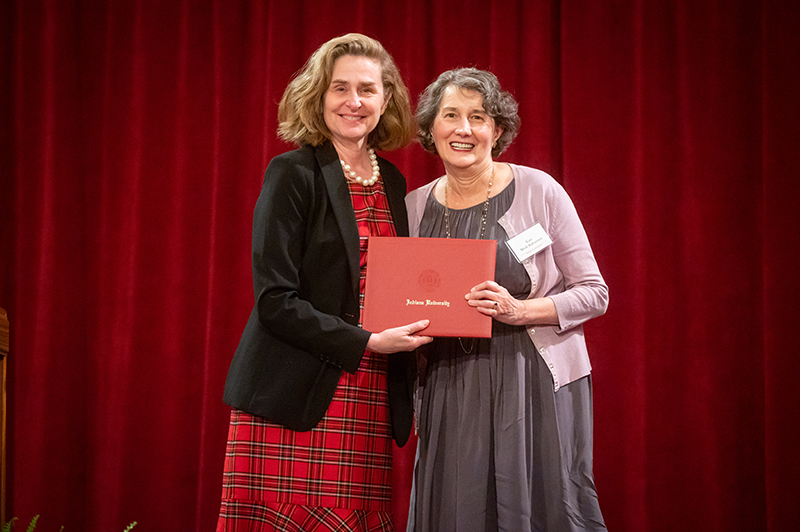Dr. Wools-Kaloustian Honored for International Contributions
Kara Wools-Kaloustian, MD, MS, is the recipient of the 2022 Indiana University (IU) John W. Ryan Award for Distinguished Contributions to International Programs and Studies.
The award honors faculty members and librarians from all campuses for their exceptional contributions to the university’s international programs and studies. Initiated in 1991, the award is named after late Indiana University President John W. Ryan who led the university from 1971 to 1987 and was instrumental in fostering IU’s commitment to excellence in international education.
“Dr. Wools-Kaloustian represents Indiana University with excellence both nationally and internationally and, as an infectious disease physician, would make a stellar selection in a year dominated by an infectious global pandemic and other health challenges. Her work spans the academic health mission including exemplary clinical care, lifesaving research and career-building mentorship and training,” said IU School of Medicine Dean Jay L. Hess, M.D., Ph.D., M.H.S.A. in his nomination letter.
Dr. Wools-Kaloustian is director of research for the Indiana University Center for Global Health and co-director of research (North America) for IU’s 30+ year AMPATH partnership in Kenya. The AMPATH partnership has grown to include more than a dozen universities around the world working in partnership with Moi University, Moi Teaching and Referral Hospital and the Kenyan Government to build the public sector health system and promote the well-being of people living in western Kenya. The partnership has created one of the world’s largest and most successful HIV care and control programs. The AMPATH Research program has received more than $190M and published more than 1,000 research articles during the history of the partnership.
Dr. Wools-Kaloustian entered medical school the year that HIV was discovered to be the virus that causes AIDS. When she started clinical rotations in 1986 there was a test for HIV, but there was no treatment, and the life expectancy from diagnosis to death was about a year. She believed people living with HIV needed a voice, someone who was willing to care for them, and touch them without fear. Throughout her career, she has been both a healer and advocate.
Dr. Wools-Kaloustian was in the first IU School of Medicine residency class to complete rotations in Kenya in 1991 and the first fellow to conduct research as part of the partnership in 1992. These early global health experiences shaped Wools-Kaloustian’s entire career. She was committed to providing health care to marginalized populations from the time that she entered medical school, but that first residency rotation in Kenya opened her eyes to the possibility of improving health systems and creating systems where they did not previously exist.
She served as one of the earliest medicine team leaders for AMPATH from 1993-94 living in Kenya and working side-by-side with her Kenyan colleagues. With support from the World AIDS Foundation, she established both an educational program about sexually transmitted infections (STIs) and HIV for health care providers, and an STI diagnostic laboratory in collaboration with the Faculty of Health Sciences at Moi University.
In 2003, she became one of the founding co-directors of field research. Her groundbreaking work in establishing international collaborative research partnerships helped to build the foundation for IU’s global health research efforts.
Her research portfolio is focused on HIV in resource-limited settings and includes clinical trials, implementation science and epidemiology. She has conducted research related to both adults and children with HIV, HIV complications and prevention of mother-to-child transmission of HIV that have improved the treatment and care of patients around the world. Dr. Wools-Kaloustian is the principal investigator for the East Africa IeDEA consortium, one of seven regional data centers funded by the National Institutes of Health to provide global HIV/AIDS data. As part of this consortium, IU works closely with HIV treatment sites throughout Kenya, Tanzania and Uganda to maintain data on more than 320,000 adults and 64,000 children. The IeDEA regional data centers are managing data for more than 1.7 million HIV patients worldwide.
Under Dr. Wools-Kaloustian’s leadership, the IU Center for Global Health has focused on the concept of reciprocal innovation, or sharing healthcare innovations between high, middle and low-income countries to address shared health challenges. Innovations, such as the use of community health workers, that have been successful in rural Kenya hold promise for addressing similar problems in places such as rural Indiana. In 2015, Dr. Wools-Kaloustian was part the team that guided the response to the HIV outbreak in Austin, Indiana, based on decades of experience developing HIV care and services for rural communities in Kenya through the AMPATH program.
In addition to her roles with the IU Center for Global Health and AMPATH, Dr. Wools-Kaloustian continued to serve as the director of the division of infectious diseases into 2020 and the beginning of the COVID-19 pandemic. She was part of the team from the Richard M. Fairbanks School of Public Health recently honored as Healthcare Heroes by the Indianapolis Business Journal for their role in responding to the COVID-19 pandemic over the last 18 months. The efforts of the team to determine the rate of infection in the Hoosier state through random testing helped inform state and national policy and guidance. Dr. Wools-Kaloustian also worked with her colleagues in Kenya to adjust research guidance in the face of the pandemic and conduct research about the impact of COVID-19 on people living with HIV in Kenya.
Throughout her career, Dr. Wools-Kaloustian has served as a treasured mentor to dozens of trainees at IU, in Kenya and around the globe. She believes that mentorship is key to the continuity of science and gives her time, advice and expertise generously. Each scientific generation builds on the foundation of the previous generation and mentorship ensures this continuum.



